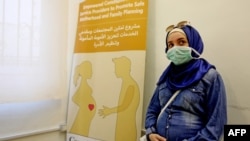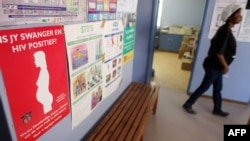Decades of progress in sexual and reproductive health are being rolled back with the poorest, most vulnerable members of society at greatest risk of losing out on lifesaving services, according to the 2024 State of World Population report.
The report, issued Wednesday by the U.N. Population Fund, UNFPA, says, “The data are damning.”
“Women and girls who are poor, belong to ethnic, racial and indigenous minority groups, or are trapped in conflict settings, are more likely to die because they lack access to timely health care.”
Thirty years ago, 179 governments that attended the International Conference on Population and Development in Cairo pledged that they would place sexual and reproductive health at the core of sustainable development, to empower women and girls, and achieve gender equality.
“There was a moment in Cairo when humanity came together in agreement that women should not die while giving life. And this is a worthy pursuit,” Dr. Natalia Kanem, UNFPA executive director, told journalists in Geneva on Monday, in advance of the report’s publication.
Unfortunately, she said, the promise of Cairo is not being met. Women are still being left behind. That, she added, is happening after a generation of notable achievement in reducing the rate of unintended pregnancy, in lowering maternal deaths by one-third, and in securing laws against domestic violence in more than 160 countries.
“In the report, we show that inequalities are widening, human reproduction is being politicized. The rights of women, girls and gender-diverse people are the subject of increasing pushback … progress is slowing and by many measures it has stalled completely,” she said.
“Annual reductions in maternal deaths have flatlined. Since 2016, the world made zero progress in saving women from preventable deaths in pregnancy and childbirth,” she said, noting that 800 women die every day giving birth.
Instead of being empowered, she said women continue to be repressed and denied their rights. “One woman in four cannot make her own health care decisions, one woman in four cannot say no to sex, and nearly one in 10 are unable to make their own choices about whether or not to use contraception,” she said.
The report finds racism, sexism, and other forms of discrimination are blocking women’s and girls’ access to sexual and reproductive health and that those living in poor, developing countries are far more likely to die from a lack of services than are women and girls in richer countries.
The report says African women are most at risk. It says an African woman who experiences pregnancy and childbirth complications is around 130 times more likely to die from them than a woman in Europe or North America.
It says nearly 500 deaths a day, more than half of all preventable maternal deaths, occur in countries with humanitarian crises and conflicts.
The report notes that women of African descent across the Americas are more likely to die in childbirth than white women, noting, “In the United States, the rate is three times higher than the national average.”
Kanem says the data show that “inequalities are killing women,” adding they are dying because “health systems today are weak, tainted by gender inequality, by racial discrimination, and by misinformation.”
For example, she notes that midwives are undervalued, underpaid and under-supported in male-dominated health systems “even though increasing midwifery coverage could avert more than 40 percent of maternal deaths.”
“We also see that women of African descent experience higher rates of mistreatment and neglect by health providers. Indigenous women are routinely denied culturally appropriate maternal health care.
“As a result, these groups are much more likely and, in some places, six times more likely to die in pregnancy or childbirth,” she said.
Nowhere in the 168-page report does the word “abortion” appear in the text. Kanem explains that as a U.N. entity, UNFPA does not take a position on member state policies and complies with whatever national governments determine “about that procedure.”
However, she noted that UNFPA believes that, “Where legal in countries it should be safe and accessible and where not legal, it should be clear that post-abortion services, typically presenting as hemorrhage and bleeding, must be available, no matter the legal status.
“In my mind, it is clear that unsafe abortion, the result of not having contraception … is a leading cause of this stubborn maternal death globally,” indicating that deaths from unsafe abortions are likely to be higher than the data suggest.
“Often the physician is not going to put ‘unsafe abortion’ on the death certificate. You will see hemorrhage or some other concomitant cause,” she said.
The report shows that investing in sexual and reproductive health benefits everyone and would contribute trillions of dollars to the global economy.
Authors of the report say that spending an additional $79 billion in low- and middle-income countries by 2030 “would avert 400 million unplanned pregnancies, save one million lives and generate $660 billion in economic benefits.”

